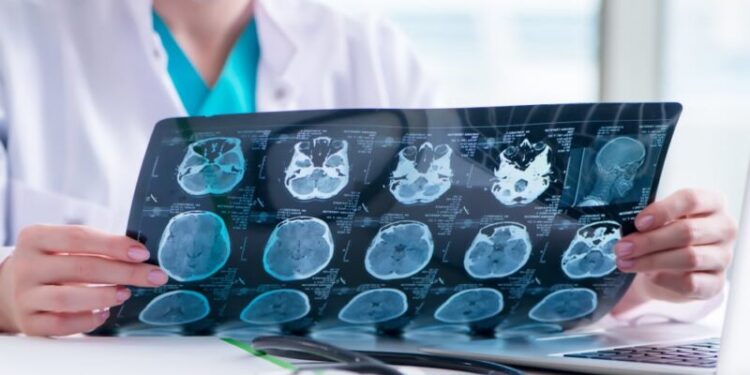@TeacherToolkit
Ross Morrison McGill founded @TeacherToolkit in 2010, and today, he is one of the ‘most followed educators’on social media in the world. In 2015, he was nominated as one of the ‘500 Most Influential People in Britain’ by The Sunday Times as a result of…
Read more about @TeacherToolkit
How do we develop a neuroscientific curriculum for teachers?
Whilst neuroimaging experiments (MRI) has deepened our understanding of the brain, most studies prevents a direct application to the field of education.
Returning to an earlier publication on Neuroeducation: Why and how to improve neuroscientific literacy in teachers, there is an excellent section on curriculum.
Not yet suitable for the classroom …
The research argues that despite the field of neuroeducation existing for about 40 years, there is some lack of progress. The first is that neuromyths are still prevalent. Secondly, cognitive neuroimages are scientifically relevant but cannot be used for direct application in the classroom.
I recall a conversation with Professor Barry Hymer, who suggested one day that “all headteachers will receive a psychological report and an MRI scan with a neuroscientific analysis of the brain function of their pupils” to help target intervention.
The third problem is the didactics of teaching, where the promise of neuroeducation may lie more in pedagogical inspiration and support.
Consider what teachers should know?
One of the suggestions for developing a neuroeducation curriculum for teachers (possibly as part of initial teacher training or in-house professional development) is:
- Teachers being given a basic insight into brain plasticity and brain development
- Understanding what sensory circuits are, particularly synaptic pruning during childhood and adolescence development.
- A basic understanding of the different disciplines within neuroscience.
- An overview of basic functions of the brain: motor function, impulse control, cognitive flexibility, concentration, memory, learning and forgetting, language and executive function.
There are five regions of the brain. Inside the telecephalon, there is the cerebral cortex (higher order thinking).
Developing a neuroeducation curriculum …
They is only a limited amount of scientific information available on the effects of application of neuroeducation on practice or attitudes of teachers (Jolles & Jolles, 2021). This paper found only ten references, so we are clearly into new territory.
As ever, when designing any curriculum, what are the intended outcomes, who is it for, how long do we have available and why and how will the content be determined and delivered?
The section of the original paper is offered as a starting point amongst professionals from the “fields of neuroscience, cognitive and behavioural science and professionals from the field of education, notably teacher trainers.”
The first stumbling block to recognise is how do you go about organising any practical course?
There is only limited access to literature, tools and sources that are deliberately aimed at teachers.
The second biggest headache is that many sources are not yet based upon evidence or evidence-informed interventions in the educational context.
A shared vocabulary is needed between neuroscientists and educators, and many people already have been contributing in this area; notably Prof Sarah-Jayne Blakemore who I have had some interactions with. I would strongly recommend all teachers read her books.
- Blakemore, S.-J., and Frith, U. (2005). The learning brain. Lessons for education.
- Blakemore, S.-J. (2018). Inventing ourselves: The secret life of the teenage brain
How does a memory form anatomically?
A multidisciplinary approach
One thing that will be required, at least in England, is consideration of education in the early years classroom, a pupil referral unit, or a student with complex ADHD needs in a secondary school. From my Just Great Teaching, 15,000 pieces of data suggested that most teachers lacked confidence in pupils’ mental health and special educational needs.
This was prior to the pandemic, before we saw a mental health crisis emerge. Delivering mental health and special educational needs is an essential professional development must in every school I visit. It’s a complex minefield and can take a lifetime to master.
I wonder if teachers knew more about the brain, could it help them work more efficiently with young people?
With high levels of workload and a relatively poor diet of professional development, at least in the number of hours made available, we should be considering how we can start to reform professional development in our schools.
How can we help our teachers to become experts not just in teaching, but also in learning?
Whilst many schools are moving away from one-off INSET days to more of a spaced and interleaving model, we need to get to a position where “neuroscience provides contributions of brain training techniques to help inform a curriculum” for teachers. One that “makes use of valid sources which can be trusted.”
There are a great number of teacher-related research books now being published.
In the meantime, I’ve copied a few screenshots from my book, Guide To Memory, to highlight some of the language that I have been delivering in schools as part of my teacher training menu to support the professional development of teachers. The challenge is how to bring this all to life in a practical context … and help teachers understand that it will make things easier for them.
Some of the brain terminology I have been learning in my research to support teachers …
It is indeed not possible to translate neuroscience insights directly into educational interventions. However, apart from prescription about teaching, there is conceptual knowledge about the interplay between mind, brain and education.
Understanding more about the brain will provide teachers with further autonomy, helping them to make more informed decisions.




















